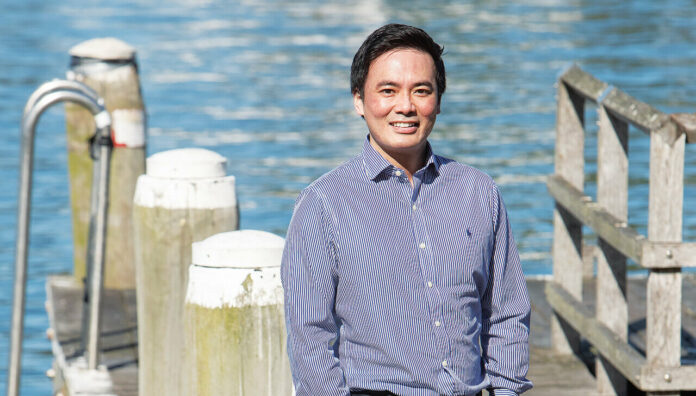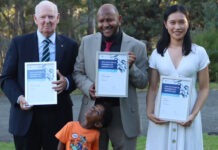Jason Phan MPS wanted to help those most in need. The pharmacist-trained technology enthusiast and avid long-distance runner has found his niche in digital health.
What led you to pharmacy?
In my previous career as a fly-in, fly-out scientist working on bioremediation for mining companies, I was immersed in the fascinating intersection of science and environmental stewardship. Witnessing the environmental impact on communities, particularly in rural and remote areas, highlighted the interconnectedness of ecosystem health and community wellbeing.
In my role, I focused on mitigating environmental challenges but was also acutely aware of the unique health disparities faced by these communities, underscoring the importance of accessible healthcare –particularly in areas of limited resources. So, I engaged in outreach health programs aimed at addressing the specific needs of marginalised rural communities.
This deepened my commitment to making a lasting impact on the health and lives of individuals facing significant challenges so leading me to becoming a pharmacist in 2014. In my downtime now, I organise logistics of medicines and resources to hard-to-reach areas.
Tell us about your pharmacy roles.
Throughout my short time as a pharmacist, I’ve worked in diverse pharmacy roles, each providing a unique perspective and skill set. As an intern clinical pharmacist, I cultivated a strong foundation in patient care, pharmacology, and counselling. For more community outreach, I then worked in a community pharmacy. Engaging with patients enhanced my skills and instilled in me the importance of a personalised approach to health care.
I returned to clinical pharmacy at Westmead Hospital in Sydney, where my expertise grew in a more specialised, fast-paced environment, collaborating with healthcare teams to ensure optimal medication therapy for patients. The hospital setting allowed me to contribute to patient care plans, join interdisciplinary rounds, and manage complex medication regimens. I specialised in pharmaceutical production at Westmead, involved in manufacturing specialised medicines for patients with rare diseases and conditions.
This role provided a comprehensive view of production, from protocols to regulatory compliance before my recruitment to eHealth, where I used my expertise in pharmacy and production to manage the NSW Hospital Pharmacy Pharmaceutical List.
What’s best about your eHealth role?
As a Clinical Application Analyst overseeing electronic medication management systems at Healthscope, I collaborate closely with healthcare professionals, tailoring electronic systems to meet the unique needs of clinical environments.
I’ve leveraged my experiences as a community pharmacist, clinical hospital pharmacist, and pharmaceutical production specialist to enhance electronic medication management systems. While Healthscope is not exclusively pharmacy-focused, the organisation values the expertise of pharmacists in the development and optimisation of electronic medication management.
The collaborative environment facilitates the integration of diverse perspectives, ensuring electronic systems align with the needs of both healthcare professionals and, ultimately, patients. One of my most rewarding experiences has been playing a pivotal role in the implementation and training of healthcare professionals on medication management systems.
Would you recommend digital health as a career?
Yes, the combination of skills in medicine Mangement and patient care while developing proficiency in technology solutions enhances your marketability. Digital health is still in an early phase. The continued advancement of AI and automation present many opportunities.
In the coming years, I will integrate these tools into current pharmacy practice, allowing for more precise decision-making, personalised patient care, and the ability to focus on the higher interoperability of pharmacy practice.
Any advice for ECPs?
Embrace dynamic changes in the healthcare landscape, particularly the exponential growth of digital health. A decade ago, the landscape looked different. Digital health was not as prominent. Finding a specialty you enjoy is an exploration. Be open to learning. Take on new challenges to find your passion.
A day in the life of Jason Phan, Clinical Application Analyst, Healthscope, Sydney, NSW
| 6.00am | Morning run
Start the day with a 10–20-kilometre run from Gladesville in the Lower North Shore of Sydney to the city and back, followed by daycare drop-off duty. |
| 9.00am | Stand-up meeting
Meet the team to go over daily priorities and blockers. Generally, I take this time to talk to managers and colleagues about upcoming upgrades, patches, or patient issues. |
| 10.00am | Training time
Conduct training for doctors, nurses or pharmacists on our electronic medication management system. A big emphasis is placed on safety and adhering to protocols. |
| 12.00pm | Stakeholder engagement
Oncology project stakeholder meeting, revolving around rolling out and building eviQ pathways into our electronic medication management system. Wide discussion on roll-out date and implementation. More discussion around workload, prioritisation of pathway building and provisions. |
| 2.00pm | Systems building
Building out and reviewing eviQ oncology and haematology pathways. Review other issues with the application, e.g. doctor unable to prescribe, or nurses unable to administer medicines on the system. |
| 4.00pm | Tie up loose ends
Almost home time. Tidy up all documentation and review issues that can be prioritised the next day. Reply to queries from staff around potential upgrades, enhancements and quality activities. |
| 6.00pm | Run before bed
Light 10-km run before dinner time and bed before 9 pm. |



 Dr Peter Tenni[/caption]
Dr Peter Tenni[/caption]
 How should we deprescribe gabapentinoids, according to the Maudsley Deprescribing Guidelines[/caption]
How should we deprescribe gabapentinoids, according to the Maudsley Deprescribing Guidelines[/caption]



 Pharmacists have always prescribed, but they have the potential to prescribe much more
Pharmacists have always prescribed, but they have the potential to prescribe much more







